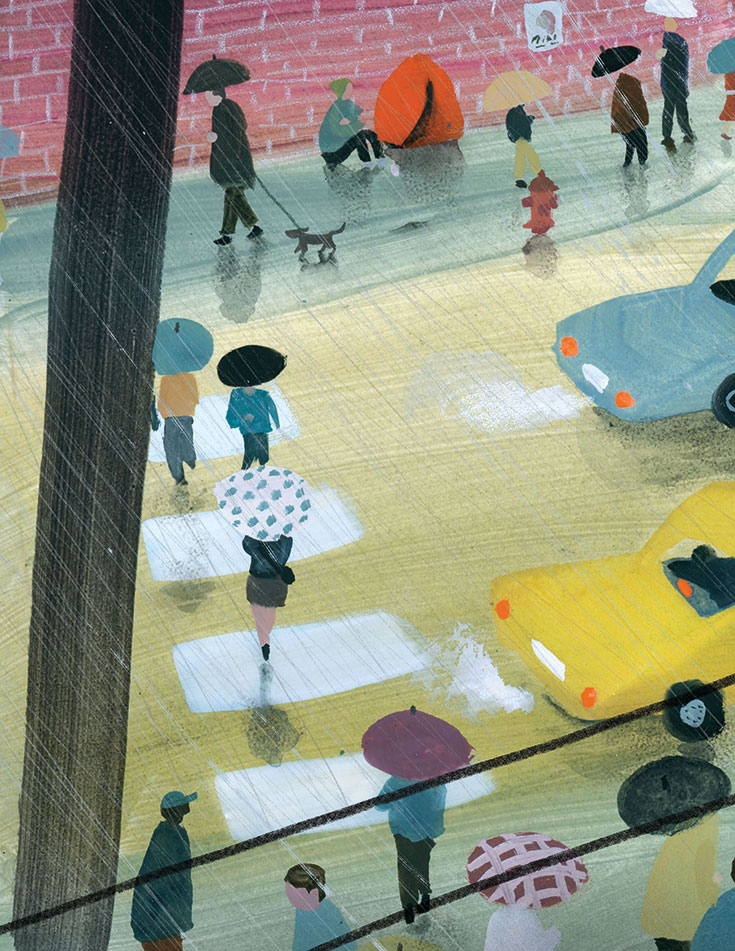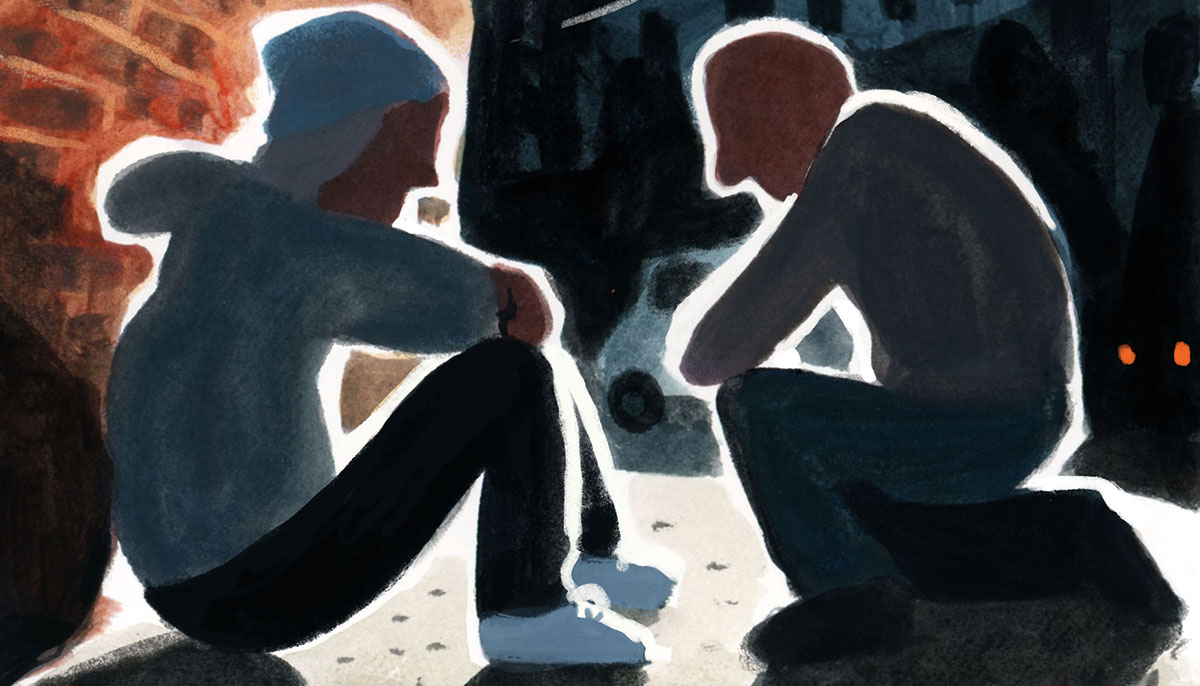Psychologist David J. Keuler is used to helping people, but this was different. Could he really practice limitless compassion?

Illustration by Sydney Smith.
On a cold November night, a woman crouches in the rain. As I prepare dinner, I see her through the window of my third-story condo. She’s conspicuously alone, with no umbrella. She shouldn’t be there, and yet she is.
Uncannily still, she doesn’t shield her face from the weather. The fragrant aroma of my meal suddenly registers as foul. I need to do something, and I want that “something” to be more than a single gesture of kindness.
Buddhism teaches limitless compassion. Can I tap into compassion like that?
I’ve never fully engaged with an individual experiencing homelessness. I’m aware such interactions can be dangerous. Do I possess the necessary skills for this situation? As a psychologist, I serve as a repository for people’s suffering and facilitate their care. But what about engaging with someone outside of a professional setting, particularly when I haven’t been invited to do so?
I’m overthinking this. She requires help, and I’m available to offer it. Buddhism teaches limitless compassion. Can I tap into compassion like that?
Overnight, the woman establishes an encampment. A shopping cart sits next to her, overflowing with clothes and with odds and ends poking through the bars. Perched on a mountain of filthy blankets, she talks to herself. She wears a bandanna around her matted hair and layers of mismatched clothing. She appears to be in her fifties.
As I exit my building that evening, the woman peers at me through black prescription glasses. There’s no avoiding her gaze. She’s eager to speak, but I keep walking. I’m still building the courage to approach her.
The next day, I remind myself that Buddhist practice is this moment, this fear, this urge to retreat. If not now, then when? There’s no awakening in playing it “safe.” My heart is pounding.
Taking a deep breath, I walk up to the woman. She’s been defecating on a paper plate that’s next to her tent, and there’s a pungent odor of urine and feces. She’s mumbling about politics, about a lost child, a recent eviction. She’s run out of her medications and asks if I know her doctor. I don’t, but I tell her I’m a doctor of sorts.
Quickly, she begins to share. I listen intently. I’ve been trained to listen well, to hear what others cannot bear to hear.
I determine to help her insofar as I can. I want to be better at extending myself. I want to practice greater compassion.
“You live there?” She points to my building.
“I do.” I point to my window, though my finger is reluctant to do so.
“Will you watch over me tonight? I’m afraid.”
“Yes, I’ll watch out for you. My name is Dave. It’s good to meet you.”
“Lisa.”
“See you tomorrow,” I say, with every intention of doing so.
And I do. I visit her most weeks over the following months. During this time, I’m privy to a host of conspiracy theories, an ongoing conversation with an ex-partner who’s apparently absconded with her child, requests for items to help her pass the time, and reluctant declarations that she’d like a pizza or a deli sub. She’s suspicious of most people and doesn’t like accepting food or drink. Much of what she’s received sits piled around her feet, unopened.
But slowly, Lisa begins to trust me. I feel the weight of this—a mix of compassion, worry, and frustration. Does she have enough food and water? Why isn’t she using the pillow I bought her? Where are the warm socks I got her? Why is she still barefoot? When will she use the lawn chair I’d hoped would relieve her aching back? At times, Lisa can think clearly. More often, she’s delusional.
One day, I bring her a pizza. “Lisa, are you in there?”
“Dave, is that you?”
Today she remembers my name, and I feel a rush of joy. She isn’t up for talking but is grateful for the pizza. She unzips the tent just enough for me to pass the box through. “Thanks, hon.” She continues rambling to herself, and I muster the courage to ask for her surname. My inquiry feels nosey but necessary. She’s someone’s daughter.
From a previous conversation, I know where Lisa grew up. Now, with her full name, I have enough to search. I send out Facebook messages to individuals in her home state who carry her surname. All go unanswered, save one. I receive a message from a woman who identifies herself as Lisa’s sister.
She hasn’t heard from Lisa in months. She’s shaken to learn of her circumstances and is stunned to receive a message from me.
“There’s always an angel when Lisa needs one,” she says. I sense a flash of embarrassment in her voice. “Can I send you some money?” She wants to help her sister, and I’m deeply relieved. I’m no longer alone on this journey.
“No, no need to send cash.” At that moment I realize how much joy I feel helping Lisa.
I learn that Lisa has been ill for years, and she’s been homeless for long stretches of time. Her family has tried to intervene, but Lisa isn’t easy. Off her medications, she’s frequently psychotic and disorganized.
I contact a local homeless agency. To my surprise, they’re acquainted with Lisa and will send someone to check on her. What a relief. I cannot put her up in a hotel; she’s psychotic and unstable. She refuses to go to a shelter. This is so difficult. At least the agency will intervene.
The next day I tell Lisa about her sister. She’s angry. She hates her sister. She won’t return to her home state to be with her or accept her help. Lisa believes her sister forsook her. I’m crestfallen. Was I wrong to contact her family?
As the weeks pass, winter asserts itself. Lisa’s tent flaps in the wind. She spends all her time zipped in her tent awaiting no one but me. She asserts that she has no means of escaping her God-forsaken situation.
How will this end? Will she become the “child” I never had? I feel trapped. Why am I not open to caring for her indefinitely? I feel alone again. The homeless agency tells me there’s nothing more they can do.
I’m wrestling with the limits of limitless compassion.
Lisa asks if I’ll take her feces with me and flush them down my toilet. They’re overflowing the paper plate, and she has nowhere else to defecate. I cannot find the strength to say yes, and I feel as though I’ve failed. A forgiving inner voice reminds me I don’t have to be perfect. That said, I walk away with my head bowed.
There’s snow beneath my feet, and the crunch of each step echoes into the night. I am off to buy her favorite sub: Italian meatballs with Parmesan cheese and pickles. Yes, pickles. The attendant at the restaurant cocks his head. Seeing his reluctance to add pickles to meatballs, I smile. Lisa makes this peculiar request because, in her mind, pickles are nutritious. Pizza, though, is soul food and doesn’t require nutritional credentials. It’s her one pleasure.
Late January, two police officers stand outside of Lisa’s encampment, motioning for her to leave. An encampment is unlawful in D.C., and apparently someone is tired of the eyesore. Lisa is frantic. The edema in her feet (according to her) keeps her from wearing shoes. In the cold, she must drag her many possessions to a new location. She wrestles with an uncooperative tent, her legs resisting movement. She’s been supine for weeks, and her body is unsteady.
I’m sick to my stomach. How can this gentle soul deserve this much punishment?
I set off to buy Lisa new cuticle scissors (“Someone stole them from my tent.”), a blanket, a hair brush, Tylenol PM (“Can you get me some, hon? I can’t sleep some nights.”), and, of course, a pizza. I add sweets to soften the blow from her jolting relocation.

Illustration by Sydney Smith.
A few days later, I arrive to find Lisa gone. Her belongings, including her tent, crowd a community trashcan. Her absence sends me reeling. What has happened to Lisa? Is she okay? Will I ever see her again? I haven’t said goodbye. How will I explain this to her sister? I’ve lost her.
I pace in my living room, glancing through the window at the empty street below. She’s not there, and yet she should be.
Over the following months, I imagine saying my goodbyes many times. Lisa is impossible to forget. I nurse regrets. I didn’t achieve a fully open heart. I didn’t bring her feces to my toilet.
Still, I know I’m forever changed, and I owe Lisa immense gratitude. I’m now more compassionate to others and myself and can forgive my reluctance to care for her indefinitely. Lisa awakened something within me—a deeper appreciation for what limitless compassion is. It’s not so much the final destination that matters but the willingness to take that next compassionate step.
Months after Lisa vanished, I receive an unexpected email. The subject heading reads, “lady in the tent.”
Hi Dave, the doctor who saved me,
Thank you for helping me. I’m a paranoid schizophrenic, and I cannot tell you what you meant to me as I was disorganized in my thoughts. When I was at the hospital, I said, did Dave call? The doctor replied, who’s Dave, I said, he’s my father. The doctor said, great, what’s his number? My brain said, I don’t know. Then the doctor said, what’s his last name. I said, he didn’t tell me, but he brought me corn chips and pizza.
I had hypothermia and lost thirty-five pounds. The Invega shot brought my brain back. Could I do something for you or give you money for the things you bought? I appreciate what you’ve done for me. If there’s anything I can do, please let me know. My brain was calling you sparkle eyes. I drew hearts on the wall with Dave in them. So funny. They had to repaint the walls. Anyway, thank you.
Lisa
P.S. My sister and I finally have a great relationship. See what you did doctor.
Tears of joy and relief stream down my face. Lisa is safe!
Later I learn she’ll receive an apartment of her own thanks to a community homeless agency. She’s stable on several medications and now knows the whereabouts of her child.
Lisa has found her way out of the tent and into my heart. She had so much more to give than she will ever know.
